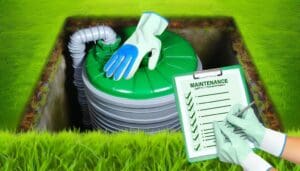Discover how to protect your septic system from breakdown with...
Read MoreYou & Your Septic Tank
Going Off The Grid? Here's What You Need To Know About Maintaining A Septic Tank System
Our professional septic service team offers comprehensive septic tank pumping services to keep your system running smoothly. Get a FREE Quote Today.

Going Off The Grid? Here’s What You Need To Know About Maintaining A Septic Tank System
So, you’ve decided to take the leap and embrace the freedom of going off the grid! I can’t blame you – there’s something incredibly liberating about living a self-sufficient lifestyle, away from the constant hum of city life.
As someone who made this choice years ago, I know firsthand how exciting and fulfilling it can be. However, in order to truly enjoy your newfound independence, it’s crucial that you properly maintain one often-overlooked aspect of off-grid living: your septic tank system.
Now don’t let this intimidate you! As a seasoned expert on all things septic tanks, I’m here to guide you through everything you need to know in order to keep your system functioning smoothly. After all, nobody wants their pursuit of freedom hindered by an unpleasant plumbing disaster!
By following some simple guidelines and understanding how your septic tank works, you’ll not only protect your investment but also ensure that your off-the-grid haven remains clean and healthy for years to come. So grab a shovel (just kidding!), and let’s get started on mastering the ins-and-outs of maintaining your very own septic tank system.
Understanding The Components Of A Septic System
Imagine your septic system as an underground superhero, silently and efficiently working beneath the surface to protect you and the environment from harmful waste.
At its core, a septic system is made up of several components that work together in perfect harmony – like a well-rehearsed orchestra – to treat household wastewater.
The key players in this symphony are the septic tank itself, bio filters, leach fields or drain fields, and sometimes additional pumps or alarms for added protection.
Now let’s dive deeper into these essential elements.
A typical septic tank is divided into two compartments where solid waste settles down while liquid effluent flows out to be treated by natural processes such as percolation through soil layers or evapotranspiration via plants.
Bio filters come into play here – they’re essentially living organisms that help break down organic matter present in the wastewater before it reaches the leach field.
Speaking of which, leach fields (also known as drain fields) act as the final stage of treatment; consisting of trenches filled with gravel and perforated pipes, they allow water from the septic tank to disperse evenly into surrounding soil for further filtration by Mother Nature herself.
By understanding each component’s role within your septic system, you’ll gain greater insight on how to keep it functioning optimally while embracing your newfound off-the-grid lifestyle!
With this foundation laid, we can now delve into designing a septic system tailored specifically for your home without missing a beat.
Designing A Septic System For Your Home
Now that you’re ready to take the plunge and live off the grid, it’s time for us to get down and dirty with designing a septic system tailored to your home.
You might think this is only about choosing the right size tank, but there’s more to it than meets the eye! We need to consider factors like evaluating soil conditions, selecting an appropriate location for the drain field, and determining what type of system best suits your needs.
When evaluating soil on your property, don’t worry – I’ve got you covered. As a septic tank system expert, I’ll guide you in performing percolation tests to see how well your soil can absorb wastewater. This crucial step will help us determine if any modifications are needed before installation begins.
Choosing the perfect location also plays a big role here: we want somewhere that’s not too close to water sources or other structures – after all, nobody wants sewage accidentally contaminating their drinking water or damaging their foundation!
By taking these essential steps together, we’ll make sure that your new septic system serves as a reliable cornerstone of your self-sufficient lifestyle.
But hold onto your hat because next up is where things really start to come together – installing a septic system designed just for you!
Installing A Septic System
Ah, the good old days when installing a septic system was as simple as digging a hole and hoping for the best. But now, in our quest for liberation from public utilities and finding self-sufficiency, we’ve come to understand how vital it is to properly install and maintain our very own waste management systems. And let me tell you – I’m your go-to expert on all things septic tank systems!
So where do we start? First of all, choosing location is crucial. You wouldn’t want to place your septic tank too close to your home or any water source, nor would you want it uphill from these places (gravity can be cruel).
Selecting materials comes next: make sure you’re using high-quality materials that are appropriate for the soil type in which they’ll be installed. Trust me – this investment will save you time, money, and headaches down the road.
As an expert with years of experience under my belt, I strongly urge you not to cut corners during installation since doing so could lead to disastrous consequences such as groundwater contamination or even total system failure! No one wants that kind of mess on their hands.
With everything set up just right, your newly-installed septic system should serve you well while keeping Mother Nature happy too. It’s like having the freedom of living off-the-grid but without sacrificing modern conveniences!
Now that we have covered installation basics, let’s dive into inspecting and testing your septic system—because knowing how to keep it running smoothly is equally important.
Inspecting And Testing Your Septic System
Now that you’ve successfully installed your septic system, it’s time to make sure it stays in tiptop shape. Don’t worry; I’m here to guide you through the process of inspecting and testing your new off-the-grid buddy. You’ll be a pro at this in no time!
Just remember, regularly scheduling maintenance checks is key to preventing any unpleasant surprises down the road. To keep up with the demands of your newfound freedom, it’s essential to stay on top of upgrading equipment as needed. Trust me, investing a little bit now can save you from costly repairs or even complete system failure later on.
Plus, maintaining a healthy septic system will give you peace of mind knowing that your home remains eco-friendly and self-sufficient. So let’s dive into how to effectively inspect and test your septic system before we move onto one crucial aspect – pumping your septic tank.
Pumping Your Septic Tank
Now that you’ve decided to go off the grid, one of the most important aspects of maintaining your septic tank system is pumping it regularly. You can’t just set it and forget it; keeping a clean septic tank is essential for ensuring efficient soil absorption and preventing any unpleasant surprises in your backyard.
We’ll break down some key factors to consider when determining how often you should pump your septic tank:
- Cleaning frequency
- The size of your household: More people means more wastewater produced, which will require more frequent cleaning.
- The amount of water usage: If you’re using a lot of water daily (think long showers or running the dishwasher frequently), then you’ll need to pump out your septic tank more often.
- The size of your septic tank: A larger tank can hold more waste before needing to be pumped, so if you have a smaller tank, expect to schedule cleanings more frequently.
I know what you’re thinking – ‘How do I even begin figuring all this out?’ Well fear not! As a septic tank system expert, I’m here to help guide you through this process.
First things first – get familiar with your specific system’s requirements by referring to its manual or consulting with an experienced professional who has worked with similar systems. Once you have a better understanding of how everything works together, start tracking your water usage habits and adjusting them accordingly if necessary. This way, you’ll not only save on unnecessary expenses but also ensure that your little piece of paradise remains free from unwanted odors and hazards.
Next up, let’s dive into properly disposing of wastewater because there are certain steps we must follow…
Properly Disposing Of Wastewater
So, you’ve decided to go off the grid and embrace your inner freedom seeker. One of the key components to achieving this self-sufficient lifestyle is properly disposing of wastewater from your home or cabin.
As a septic tank system expert, let me tell you that it’s not as daunting as it sounds! There are various ways to ensure that you’re taking care of both Mother Earth and yourself by properly storing and treating waste from your septic system.
Now, about those alternative treatments – they can actually be quite beneficial for your system in the long run. For instance, many people opt to use natural additives like bacteria and enzymes to help break down solids more effectively within their tanks.
This eco-friendly approach not only eases up on chemical usage but also keeps things running smoothly without risking any nasty surprises further down the line (pun intended!).
So go ahead, live out your dreams with confidence knowing that you’ll have all bases covered when it comes to maintaining a healthy, efficient septic tank system. Next up: let’s dive into how exactly we can maintain our systems so that they last us for years to come!
Maintaining Your Septic Tank System
Imagine a world where you’re free from the constraints of city life, away from the noise and chaos – sounds like paradise, right? While going off the grid is undoubtedly liberating, it also comes with its fair share of responsibilities. One such responsibility that many overlook when dreaming of their self-sufficient utopia is maintaining a septic tank system.
Trust me, as someone who’s experienced in this field, I can assure you that monitoring usage and researching solutions are crucial for ensuring your new lifestyle remains blissful.
Now let’s dive into some specifics about maintaining your septic tank system:
- Regular inspections: Schedule routine check-ups to ensure everything is functioning correctly. A professional should inspect your system every 3-5 years.
- Pump-outs: It’s essential to pump out your septic tank periodically to prevent sludge build-up which could lead to blockages or even damage the entire system. Experts recommend pumping it out every 3-5 years (depending on usage).
- Monitor water usage: Keeping tabs on how much water you use daily will help prevent overloading the system; remember, conservation is key!
- Avoid harmful chemicals: Refrain from pouring harsh substances down drains as they may disrupt the natural bacteria needed for breaking down waste within your septic tank.
So there you have it! With these essential tips in hand, not only will you be able to maintain a healthy septic tank system but also embrace sustainable living without compromising on comfort or efficiency.
Up next: we’ll explore ways to avoid common problems related to septic systems so things keep running smoothly—because nobody wants unexpected surprises lurking underground!
Avoiding Septic System Problems
So, you’ve got the basics of maintaining your septic tank system down pat. That’s fantastic! But let’s take it a step further and discuss how to avoid septic system problems altogether.
By taking some simple preventative care measures and adopting eco-friendly approaches, you’ll be able to keep your off-grid haven running smoothly while also protecting our beautiful planet.
One crucial aspect of avoiding issues with your septic system is being mindful of what goes into it in the first place. Be cautious about using harsh chemicals that can kill the beneficial bacteria needed for breaking down waste. Instead, opt for natural cleaning products whenever possible.
Additionally, conserve water by fixing leaks promptly and installing low-flow fixtures to reduce strain on your system. Remember: prevention is always better than cure!
With these proactive steps under your belt, you’re ready to tackle any challenges that might come up as we dive deeper into troubleshooting common septic system issues.
Troubleshooting Common Septic System Issues
Now that you’ve got your septic system set up, it’s essential to keep an eye out for any potential issues. Don’t worry; I’m here to guide you through troubleshooting common septic system problems so you can get back to enjoying your off-grid lifestyle.
Accessing help is easier than ever as there are plenty of resources available online. However, the key lies in identifying problems early on and taking appropriate action before they escalate into costly repairs or even a full-blown replacement.
Stay vigilant when it comes to noticing changes in your toilets or drains – sluggish flushing could indicate a tank nearing its capacity. Unpleasant odors wafting around your property might be a sign that something’s amiss with the drain field.
If this happens, don’t panic! You’re not alone in facing these challenges, and many others have successfully overcome them while preserving their freedom from municipal systems. By educating yourself about how septic tanks work and understanding what signs point to trouble, you’ll become more confident in maintaining your self-sufficient sanctuary.
Armed with knowledge and awareness, let’s move forward together towards ensuring long-term success by properly caring for our septic systems every step of the way.
Taking Care Of Your Septic System For Long-Term Success
Taking care of your septic system is crucial for long-term success, and I can’t stress enough how important regular maintenance is.
As someone who’s been in the septic tank business for years, I’ve seen firsthand the consequences of neglecting this vital aspect of off-grid living.
So let me share some tips on keeping your septic system running smoothly and efficiently.
First things first, don’t be afraid to call in the pros when you need help or advice.
Choosing experts with experience in maintaining septic systems like yours will save you time, money, and headaches down the road.
Plus, it’ll give you peace of mind knowing that your family’s health and safety are being taken care of by professionals who know what they’re doing.
Remember, going off-grid doesn’t mean you have to go it alone – there’s a whole community out there ready to support and guide you on your journey towards liberation!
Frequently Asked Questions
What Are The Environmental Impacts Of Having A Septic Tank System, And How Can I Minimize Them?
As a septic tank system expert, I can tell you that there are some environmental impacts to consider when having a septic tank system. However, don’t worry!
With proper maintenance and water conservation practices, we can minimize these impacts together. By regularly inspecting your tank and ensuring the system is in good working order, you’ll prevent any potential leaks or issues that could harm the environment.
Plus, adopting water-saving habits will not only reduce the strain on your septic system but also help preserve our planet’s precious resources. So go ahead – embrace that liberating off-the-grid lifestyle while still caring for Mother Earth with a well-maintained septic tank system!
How Will I Know If My Septic System Is Compatible With The Local Regulations And Zoning Requirements In My Area?
First and foremost, let’s get one thing straight: navigating local regulations and zoning requirements for your septic system is crucial, but it doesn’t have to be a headache.
As an expert in this field, I can assure you that with proper planning and research, you’ll find yourself well-equipped to handle the permit requirements of your area.
When considering whether your septic system is compatible with local guidelines, pay close attention to proper installation procedures as these are often key factors in meeting regulatory standards.
Remember, achieving harmony between your off-the-grid aspirations and environmental responsibility starts by ensuring compliance with local ordinances – so embrace this process as an essential step towards unlocking the freedom that comes from living independently of municipal services!
Are There Any Specific Landscaping Or Gardening Considerations I Should Be Aware Of When Planning My Property Around A Septic System?
When planning your dream property around a septic system, there are definitely some landscaping and gardening considerations to keep in mind.
As a septic tank expert, I can tell you that proper soil drainage plays a crucial role in the effectiveness of your septic system, so make sure to choose plants with shallow roots and avoid planting trees too close to the drain field.
Additionally, incorporating water conservation strategies like drought-tolerant plants or rainwater harvesting systems will not only help protect our planet but also reduce the strain on your septic system.
Remember, creating an oasis for your off-the-grid home doesn’t have to compromise its functionality – just plan smart!
How Can I Safely And Effectively Use Household Cleaning Products Without Negatively Affecting My Septic System?
Imagine your septic system as a delicate ecosystem, where balance is key to its survival. Safely and effectively using household cleaning products without negatively affecting this intricate world requires some forethought and consideration.
First, you’ll want to practice safe disposal of any potentially harmful substances, such as paint or chemicals that can upset the balance within your tank.
Secondly, implement preventative measures like choosing eco-friendly cleaners or limiting the use of bleach – moderation is essential here!
Remember, as a diligent homeowner and septic tank system expert-in-the-making, keeping harmony in this hidden underground environment will contribute to not only the health of your home but also grant you that sought-after sense of liberation from relying on public utilities.
What Are The Potential Health Risks Associated With A Poorly Maintained Septic System, And How Can I Prevent Them?
When it comes to the potential health risks associated with poorly maintained septic systems, you’ve got to be vigilant as waterborne illnesses can become a real concern.
If your septic tank isn’t properly taken care of, harmful bacteria and pathogens could find their way into your family’s drinking water supply – yikes!
But fear not, my friend!
By staying on top of regular maintenance tasks like pumping out your septic tank every 3-5 years and avoiding putting harsh chemicals down the drain, you’ll protect both your loved ones’ health and ensure that you’re living life off the grid in harmony with nature.
Trust me; taking these precautions is totally worth it for the peace of mind and freedom they provide!
Conclusion
In conclusion, going off the grid and maintaining a septic tank system can seem like an intimidating task, but with proper knowledge and care, it is entirely manageable.
It’s crucial to remember that our actions have lasting effects on not only our immediate environment but also the world as a whole – so taking responsibility for your septic system truly makes you an eco-warrior in your own right.
By being diligent with local regulations and zoning requirements, thoughtfully planning your landscaping and gardening around your septic system, using septic-safe cleaning products, and keeping up with regular maintenance checks, you’ll be able to prevent potential health risks associated with poorly maintained systems.
Trust me when I say that the sweet smell of success has never been so satisfying!
So go forth confidently into your off-grid adventure! Equip yourself with the knowledge and dedication necessary to maintain a healthy and environmentally friendly septic tank system.
Future generations will thank you for making such a monumental effort towards preserving our precious planet.
You may also like...
Why Are DIY Fixes Essential for Septic Tank Pumping?
Tap into the importance of DIY fixes for septic tank...
Read MoreUnveiling the Average Costs of Septic Tank Pumping
Master the mysteries of septic tank pumping costs and avoid...
Read More
The Best Septic Tank Pumping Services Near You

Answer Some Questions
Let us know about your needs so we can find you the right septic tank pros.

Get Quotes
We will put you in touch with the right septic tank pros for your job and location.

Hire Right
Compare quotes, message or call pros, and hire only when ready.



